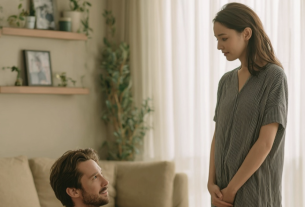The soft hum of the kettle filled the kitchen as Elena perused her selection of teas: chamomile, mint, and the black tea with bergamot that Vika had brought back from her last business trip to London. A smile played on Elena’s lips as she remembered the day, five years earlier, when Vika had presented her with the apartment keys.
“Here, Mom, a place of your own,” Vika had declared, placing the keys in her hand. “No more temporary spaces.”
This old kitchen had become her sanctuary. Every element, from the faded tablecloth to the geraniums on the windowsill, and even the cracked kitchen tile, spoke of home. As she was about to pour the tea, the doorbell echoed through the room.
Vika stood there, clad in a crisp business suit, her expression unreadable and cold.
“We need to talk, Mom.”
Elena moved aside, allowing her daughter inside, her heart tightening at Vika’s tone.
“Come in, love. I’ve just brewed your favorite tea,” Elena offered.
“No, thanks,” Vika said, standing rigid. “I won’t be long. You need to leave the apartment by tomorrow.”
The kettle slipped slightly in Elena’s grasp. “I’m sorry, what?”
“We need to vacate the apartment by tomorrow. I can’t put this off any longer.”
As tea dripped onto her hand, Elena barely registered the burn.
“But Vika, this is my home. You gave it to me…”
“It’s just a property, Mom,” Vika interrupted, checking her phone. “It’s time you left.”
“Left?” Elena’s laugh was tinged with disbelief. “But I handle all the utilities, I maintain—”
“Let’s not argue, Mom,” Vika said, her face hardening. “I’ve made my decision. Please leave the keys.”
As Vika turned to leave, Elena caught her arm. “Wait! Why? Please, tell me what’s changed?”
“It’s just business, Mom. It’s more profitable to rent it out,” Vika replied curtly, pulling away.
The door shut behind her, leaving Elena alone with a haunting silence. She sank onto a stool, her gaze fixed on a tea puddle reflecting the last rays of sun.
Elena rose mechanically, wandering to the living room where photos lined the walls: Vika in her graduation gown, both of them at the beach, Elena laughing as she shielded a sandcastle from the waves—a castle she had funded by selling their summer home for Vika’s education. Love, not sacrifice, had motivated her choices.
“My little girl,” she murmured, tracing a photo with her finger. “How did we come to this?”
Night fell as Elena packed her belongings, pausing occasionally to touch the marks of her life here: the peeling paint she meant to repair, the cozy glow from her favorite lamp, the play of shadows from the geraniums. Every detail was a shard of her heart.
Holding on to a thread of hope, she wished for a morning phone call, a laugh, an admission of a joke. But silence reigned, and the clock ticked down her final hours in this place she called home.
Her first homeless night found Elena in a park, clutching her suitcase, gazing up at the indifferent stars. People elsewhere were tucked in their beds; she wondered how her life had unraveled to this.
Before leaving, she polished the keys and left them on the table, a final act of care. Perhaps Vika would see them and remember her mother’s enduring love.
“Good evening,” came a gravelly voice from the other end of the bench. Elena startled slightly. A man with a scruffy beard and worn coat had taken a seat. “Don’t worry, I’m just sitting. Spending the night out here too?”
Elena instinctively pulled her suitcase closer.
“No, I’m not… I’m just taking a walk.”
The man let out a low chuckle.
“At three in the morning? With a suitcase?”
“Believe it or not,” Elena attempted a smile, but her nerves betrayed her. “I enjoy walks at night.”
“Understood,” he said, reaching into his coat and producing an apple. “Care for one? I washed it at the fountain.”
Elena declined with a shake of her head, though her empty stomach growled in protest.
“I’m Semyon,” he said as he took a bite of the apple. “Been out here for a few months now. My wife threw me out. How about you?”
“Daughter,” Elena responded more candidly than intended.
Semyon nodded, empathetically. “Times change, huh? I’ve got a son in America, been waiting on his call for two years now.”
As dawn approached, the chill in the air deepened. Elena had dozed off, leaning on the bench. When she awoke, Semyon was gone, but he had left another apple and a note with a shelter address, suggesting it was a warm place that sometimes offered food.
With daylight breaking, Elena stretched her stiff limbs, contemplating her next move. The shelter seemed too daunting a step for now. Perhaps she could turn to Anna, her neighbor who had always been kind.
Approaching Anna’s door required several moments of hesitation before she could ring the bell.
“Lenochka?” Anna greeted her in a floral robe, shock etched on her face. “You look so pale!”
“Anya,” Elena’s voice cracked, “might I stay with you for a few days?”
Inside Anna’s cozy kitchen, the aroma of freshly baked buns filled the air, a sign of her small morning indulgences.
Listening to Elena recount her ordeal, Anna shook her head. “I always said you spoiled her. Remember her rudeness at your party? You always excused it as ‘my little girl…'”
“Please, Anya, not now…”
“It’s necessary, Lena!” Anna exclaimed, slamming her cup down. “When will you face reality? She took everything and never even thanked you!”
Looking out the window at the bustling city, Elena felt the weight of her situation. People were off to work, surrounded by the comfort of routine and family.
“You need to stand up for yourself, Len,” Anna said, placing a comforting hand on her shoulder. “You’ve always been strong.”
During her brief stay with Anna, Elena tried to keep busy by cooking and cleaning, even fixing a leaky faucet, though she felt increasingly burdensome with each passing day.
Then, she remembered Vladimir, a family friend who had once worked with her husband and had offered help in the past.
Dialing his number was fraught with anxiety—what if he had forgotten her or, worse, chose to ignore her?
“Hello, Volodya? It’s Lena, Lena Petrova.”
Soon after, she found herself in Vladimir’s cluttered office at the city shelter.
“So, your daughter threw you out?” he asked, tapping his pencil thoughtfully. “You know, our cook just left. Think you can cook?”
“I’ve done it my whole life,” Elena replied hesitantly. “But where would I live?”
“You can stay here,” Vladimir offered with a warm smile, pointing to a small but tidy service room. “You’re stronger than you think, Lena. You’ll fit right in here.”
That evening, as she entered the shelter not as a guest but as a staff member, the mingling scents of borscht and bleach filled the air. A diverse group filled the cafeteria: an elderly intellectual animatedly conversed with a young mother; Semyon, to her surprise, was setting tables.
“Elena Sergeyevna!” called out Tamara, a woman about her age. “Let me show you the ropes. We’ve all got our stories…”
In her new room, Elena sat on the bed, her phone in hand, contemplating calling Vika but deciding against it.
“Life goes on, doesn’t it?” she murmured to her reflection.
Over the next three months, Elena found a rhythm in the shelter, discovering joy in cooking for a crowd and filling her days with tasks that dulled the ache of her past.
“Elena Sergeyevna,” Tamara popped her head into the kitchen one day, “a young girl just arrived. How about making her some tea?”
“Of course, just a moment,” Elena said, retrieving a pack of cookies from a high shelf.
She placed a cup of bergamot tea before the nervous young woman, offering a piece of the comfort that had once been gifted to her from across the ocean.
The girl lifted her eyes, brimming with tears:
“Thank you. Have you been here long?”
“Just three months,” Elena responded, taking a seat beside her. “At first, I thought it was all over. But actually, it was the start of something entirely new.”
As the days passed, Elena began to capture her thoughts and feelings in writing. Initially, she scribbled random notes in a worn notebook, which slowly evolved into poems. They were rough, simple, but deeply heartfelt—so much so that when she shared them with Tamara, her friend couldn’t help but weep.
“Keep writing, Elena Sergeyevna,” Tamara encouraged her. “Your words touch the soul.”
One quiet night, Elena penned a heartfelt letter to her daughter Vika on a pristine sheet of paper. The letter, though never sent, was cathartic, detailing her journey from that fateful night in the park, the encounter with Semyon, her battles with loneliness, and her rebirth into a life filled with self-expression and newfound resilience.
“You will always be my child,” she wrote, “but I can’t live only for you anymore. Remember how you used to giggle when I read you my clumsy poems? Now, I write to find myself. I’m learning to live for me, and I hope someday you’ll understand why that’s necessary.”
Though she held onto the letter, just putting her feelings into words seemed to lift a burden she’d carried for too long.
One day, Tamara rushed into the kitchen, excitedly waving a piece of paper. “Elena Sergeyevna, there’s an opportunity for you! Maria Stepanovna from our poetry nights is offering a room for rent. She admires your cooking and your poetry…”
Soon, Elena was arranging her modest belongings in a bright, cozy room on the second floor of an old building. Maria Stepanovna, a wise and slender woman, assisted her, sharing her own tales of resilience.
“I’ve been where you are,” Maria confided as they hung curtains together. “My husband left me after thirty years. I thought I was done for. But then, I found painting. It saved me.”
That evening, as Elena watched the first winter snow blanket the city, she pondered if Vika, somewhere out there, might be witnessing the same serene snowfall.
An open notebook lay on the table, a new entry written boldly: “I hold no grudges.” For the first time in years, Elena felt a profound sense of peace. She now understood that her life would go on—not for others, but for herself.
What do you think about this story of renewal and self-discovery? Your feedback would be wonderful!
If this story resonated with you, please like and subscribe for more tales of life’s unexpected journeys. This is Jessie James, reminding you that sometimes, the end is just a new beginning.



